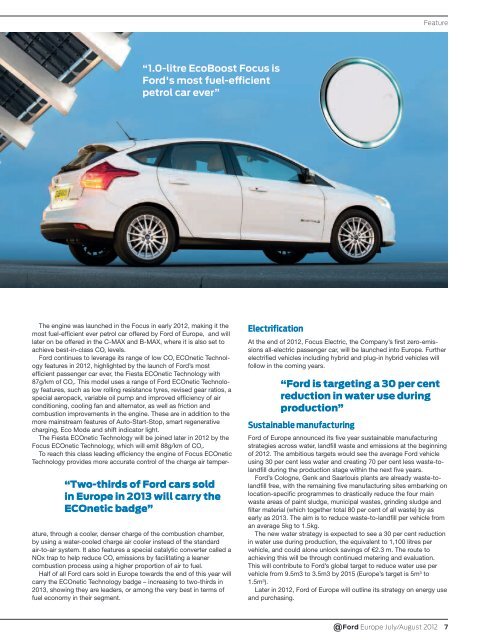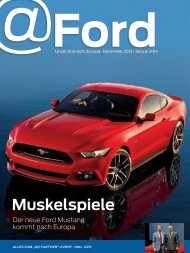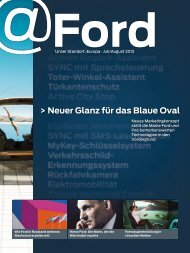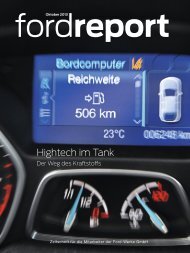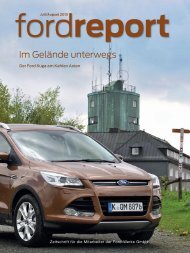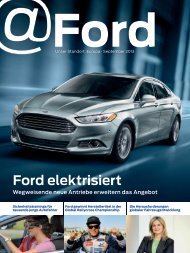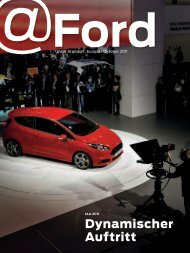“Astonishing!” - Ford
“Astonishing!” - Ford
“Astonishing!” - Ford
You also want an ePaper? Increase the reach of your titles
YUMPU automatically turns print PDFs into web optimized ePapers that Google loves.
“1.0-litre ecoboost Focus is<br />
<strong>Ford</strong>'s most fuel-efficient<br />
petrol car ever<strong>”</strong><br />
The engine was launched in the Focus in early 2012, making it the<br />
most fuel-efficient ever petrol car offered by <strong>Ford</strong> of Europe, and will<br />
later on be offered in the C-MAX and B-MAX, where it is also set to<br />
achieve best-in-class CO ² levels.<br />
<strong>Ford</strong> continues to leverage its range of low CO ² ECOnetic Technology<br />
features in 2012, highlighted by the launch of <strong>Ford</strong>’s most<br />
efficient passenger car ever, the Fiesta ECOnetic Technology with<br />
87g/km of CO ² . This model uses a range of <strong>Ford</strong> ECOnetic Technology<br />
features, such as low rolling resistance tyres, revised gear ratios, a<br />
special aeropack, variable oil pump and improved efficiency of air<br />
conditioning, cooling fan and alternator, as well as friction and<br />
combustion improvements in the engine. These are in addition to the<br />
more mainstream features of Auto-Start-Stop, smart regenerative<br />
charging, Eco Mode and shift indicator light.<br />
The Fiesta ECOnetic Technology will be joined later in 2012 by the<br />
Focus ECOnetic Technology, which will emit 88g/km of CO ² .<br />
To reach this class leading efficiency the engine of Focus ECOnetic<br />
Technology provides more accurate control of the charge air temper-<br />
“Two-thirds of <strong>Ford</strong> cars sold<br />
in Europe in 2013 will carry the<br />
ECOnetic badge<strong>”</strong><br />
ature, through a cooler, denser charge of the combustion chamber,<br />
by using a water-cooled charge air cooler instead of the standard<br />
air-to-air system. It also features a special catalytic converter called a<br />
NOx trap to help reduce CO ² emissions by facilitating a leaner<br />
combustion process using a higher proportion of air to fuel.<br />
Half of all <strong>Ford</strong> cars sold in Europe towards the end of this year will<br />
carry the ECOnetic Technology badge – increasing to two-thirds in<br />
2013, showing they are leaders, or among the very best in terms of<br />
fuel economy in their segment.<br />
Electrification<br />
Feature<br />
At the end of 2012, Focus Electric, the Company’s first zero-emissions<br />
all-electric passenger car, will be launched into Europe. Further<br />
electrified vehicles including hybrid and plug-in hybrid vehicles will<br />
follow in the coming years.<br />
“<strong>Ford</strong> is targeting a 30 per cent<br />
reduction in water use during<br />
production<strong>”</strong><br />
Sustainable manufacturing<br />
<strong>Ford</strong> of Europe announced its five year sustainable manufacturing<br />
strategies across water, landfill waste and emissions at the beginning<br />
of 2012. The ambitious targets would see the average <strong>Ford</strong> vehicle<br />
using 30 per cent less water and creating 70 per cent less waste-tolandfill<br />
during the production stage within the next five years.<br />
<strong>Ford</strong>’s Cologne, Genk and Saarlouis plants are already waste-tolandfill<br />
free, with the remaining five manufacturing sites embarking on<br />
location-specific programmes to drastically reduce the four main<br />
waste areas of paint sludge, municipal wastes, grinding sludge and<br />
filter material (which together total 80 per cent of all waste) by as<br />
early as 2013. The aim is to reduce waste-to-landfill per vehicle from<br />
an average 5kg to 1.5kg.<br />
The new water strategy is expected to see a 30 per cent reduction<br />
in water use during production, the equivalent to 1,100 litres per<br />
vehicle, and could alone unlock savings of €2.3 m. The route to<br />
achieving this will be through continued metering and evaluation.<br />
This will contribute to <strong>Ford</strong>’s global target to reduce water use per<br />
vehicle from 9.5m3 to 3.5m3 by 2015 (Europe’s target is 5m 3 to<br />
1.5m 3 ).<br />
Later in 2012, <strong>Ford</strong> of Europe will outline its strategy on energy use<br />
and purchasing.<br />
@<strong>Ford</strong> Europe July/August 2012 7


